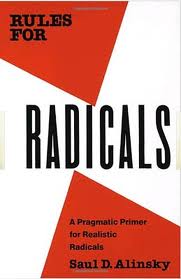SEEING THE RULE
Those established in power seek to maintain control of their power through the written word, or “policy” as we often call it today. In Rule #4, Alinsky is saying that this can be used against them. Hold the enemy, as Alinsky refers to his ideological opponents, accountable for his own words. Turn the mirror around on your opponent and make him defend his own words.
Expecting humans to be consistent – which is what it takes to always adhere to any rule or policy – is sure to provide opportunity for scrutiny. When the policy or rule is coming from a philosophical position, especially a flawed one, then it is often those in power who will find themselves fenced in by their own words.
USING THE RULE
As observed in the commentary to Rule #3, a bad policy can be exposed when it is subjected to the scrutiny of consistency. Understand who made the policy, and what the policy is supposed to accomplish. Then press to assess the policy consistently. In some cases, you will be able to demonstrate the absurdity of the policy by taking the policy to its logical conclusion.
This approach can prompt the Establishment to change bad policies or to honor its own rules in ways that it finds uncomfortable. You might even find rules that make them adopt your position. In our highly politicized climate today, “PC Police” can become worried about offending any group. Here’s an amazing example of how this rule can be applied from Rutgers University:
“Make the enemy live up to its own book of rules.”








